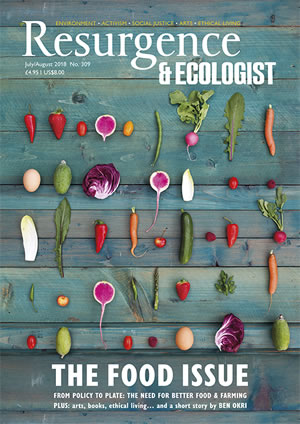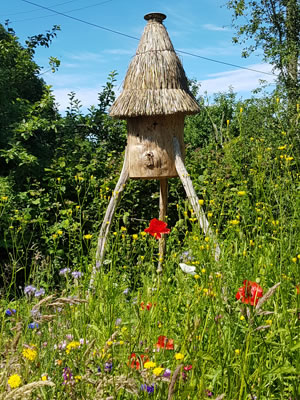We have associated them with light, summer and the promise of sweetness – honeybees, Apis mellifera. They have been mythologised perhaps more than any other creature. Cave paintings depicting humans collecting honey from wild bees demonstrate our long association; we have sanctified them with stories as the beehive became a metaphor for the ordered and charitable life.
Now we know more about this sensitive, complex, intelligent organism, and we understand that bees are under pressure. Colonies are sickening and collapsing, and bees are threatened.
Matt Somerville is a skilled woodworker based in Hampshire who, after realising that bees were disappearing from his orchard, was prompted to take action. Armed with his knowledge of trees and tools, and inspired by successful bee programmes in Poland and France, he began to produce “bee-kind” hives. This form of sympathetic, natural beekeeping is designed to benefit the health and sustainability of bee colonies, enabling them to thrive.
As Winnie-the-Pooh observed, bees like to be high up in the trees – away from the cold ground, and out of reach of predators. Matt has designed log hives to be placed in trees – these ‘freedom hives’ are chosen by bees naturally. They are better-insulated and more sparsely placed than the more intensive hives we have used in recent times, thus reducing stress and the spread of disease.
“About 150 years ago the thin-walled hive was invented,” Matt told me. “The important development was the removable frame. Up to then, bees were kept in straw skeps [baskets], and harvesting consisted of cutting the comb out and pressing it to recover the honey. Most villages would have a skep or two in their orchards, and swarms were captured locally every May. In some cases the colonies were killed in the process of harvesting honey. The new hives gave the beekeeper more access to the colony, and with the use of excluders to restrict the movement of the queen, a smaller ‘super’ box could be added. This method allowed for honey to be easily harvested and the comb reused after the beekeeper had spun off the honey, facilitating management of a colony.”
Because they are removing excessive amounts of honey, beekeepers feed sugar to their bees, but this has none of the natural minerals and other nutritional ingredients bees need. Couple with this the loss of traditional wild-flower foraging, the use of systemic insecticides, and the arrival of new pests and diseases, and we can begin to see why bees might be becoming increasingly stressed.
“Bees want to choose and build their own structures more naturally, but the comb that is fixed in an artificial, thin-walled hive could present an added stress to the bee,” says Matt. Comb sheets, known as foundation, are imprinted with hexagons determining the size of each cell. The cells are the size of worker bees – the infertile, ever-busy females. But bees in the wild normally choose to make up to 17% drone comb, which has larger cells. Although drones are believed to only serve to mate with the queen, and only about 15 drones will actually mate with her, the colony has evolved to want these male bees.
Matt explained the issue of the special properties of wax in the natural comb. “Part of a natural comb’s job is to remove any toxins from the hive, and these are absorbed into the wax, but in the artificial comb is a cocktail of chemicals that the bees don’t like. If there is no other option bees will build on it, but a swarm will never choose to go into a hive with this prospect. Another stress.”
A further issue beekeepers should consider, he says, is propolis, a substance the bees make using plant saps and resins, which is the immune system for the bee. It is antifungal and antiviral and is useful for sticking things together in the hive. Bees can use it to envelop a foreign body – even covering a whole mouse corpse in it – to stop the spread of disease. In a wild colony it is spread everywhere. Bees particularly like rough surfaces, but a thin-walled hive is made from planed timber and they often only deposit propolis in corners and use it to stick the top board down. This is an irritation to the beekeeper, who might miss the point of why propolis is so important to the bee.
Thomas Seeley, the author of Honeybee Democracy, says we need to acknowledge that the bee is the best beekeeper. He suggests that the bee knows what it wants and that we need to listen. He has coined the term “Darwinian beekeeping”, whereby we allow natural selection to choose the right bee instead of trying to select bees that may not be as well adapted as we think.
Matt Somerville’s bee-kind hives, designed for minimum intervention, reduce stress and disease in the bees. Many beekeepers are well-intentioned and want to help bees; a shift towards bee-kind log and freedom hives that are insulated, placed high in trees or on strong stilts designed to avoid too many interventions, may be just what the bees need. Matt runs courses to help aspiring natural beekeepers make their own hives.
Bees evolved over millions of years, and the threats and challenges they now face are complex; bee-kind hives may be one way of helping. The highly evolved super-organism of the swarm is able to choose what it needs. With a shift towards this form of sustainable beekeeping, we can take a step back and trust while the bee colony is ‘rewilded’, regaining resilience and beginning to thrive once more.
BEE KIND: Matt Somerville’s four ways to help the bees Flowers/forage
Grow more plants and trees that feed bees and other insects through each season. Stop poisoning them with neonicotinoids and other pesticides. Only harvest honey when there is a genuine surplus.
Fur
Keep bees in warm, insulated hives.
Freedom
Allow bees to organise the inside of the hive as they wish. Bees don’t choose preformed wax sheets or plastic comb. They like to design their own deep comb, with the queen free to roam.
Faith
Bees have been around for millions of years and have survived through many climate changes. We need to have faith that they will continue to survive without our interference. We must restrain ourselves from fiddling, and let the weaker bees die to allow for natural selection to take back control.
The Natural Beekeeping Trust is organising a conference, Learning from the Bees, in Holland this autumn. To find out more: www.learningfromthebees.org







